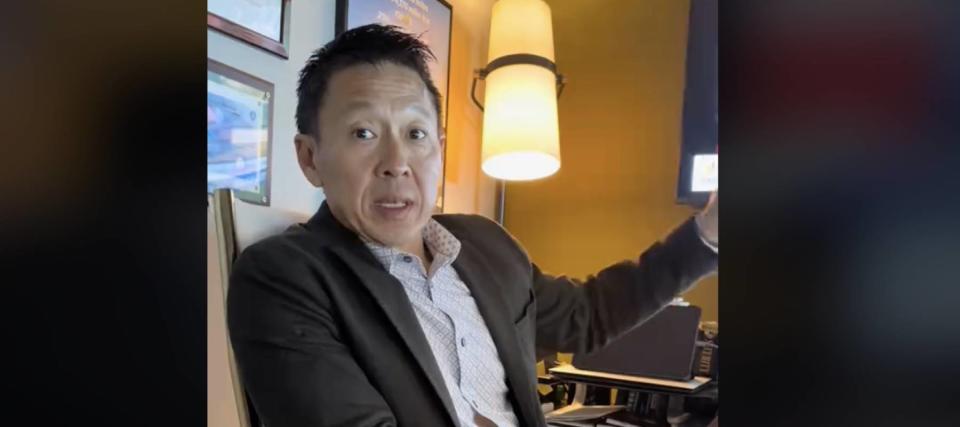‘The bank is watching you’: This is what happens when you deposit too much cash into your bank account

“Big Brother is watching you” — that’s how lots of Americans feel when they deposit or withdraw large sums of money from their bank accounts.
“People worry about… narratives out there that ‘the bank’s watching you,’ [or] ‘the government’s watching what you do,’” said husband and wife duo Alexis and Dean on TikTok.
The couple, who run a financial advice start-up, released a clip entitled, ‘What happens when you deposit more than $10,000 into your bank account?’, which has garnered more than 3.6 million views and over 2,300 comments since it was posted on Feb. 12.
Don't miss
Commercial real estate has beaten the stock market for 25 years — but only the super rich could buy in. Here's how even ordinary investors can become the landlord of Walmart, Whole Foods or Kroger
Inflation is still white-hot — use these 3 'real assets' to protect your wealth today, no matter what the US Fed does or says
Anything can happen in 2024. Try these 5 easy money hacks to help you make and save thousands of dollars in the new year (they will only take seconds)
In it, Alexis asked Dean if it is true that Americans are “not allowed” to deposit $10,000 into a bank account at any given time.
“Not allowed? That’s not true. You totally can,” a surprised Dean responded — as long as all your financial actions are above board, he added.
He went on to explain how banks manage large cash deposits and what you should expect in terms of your bank’s anti-money laundering policies.
Anti-money laundering
All federally-regulated banks are required by law to report major money transactions to the Financial Crimes Enforcement Network, or FinCEN, which is a bureau of the U.S. Department of the Treasury.
While there is “no general prohibition against handling large amounts of currency,” according to FinCEN, banks are still required to report all currency transactions (deposits, withdrawals, exchanges of currency or another payment or transfer) over $10,000 in a single day (by or on behalf of one person) through what is known as a Currency Transaction Report (CTR).
“If you walk into a bank and withdraw more than $10,000 or you deposit [$10,000], it’s just a report that gets sent,” Dean explained. “It’s not like you’re doing a crime or anything; it’s tracking more than $10,000 in currencies transacted through a bank.”
CTRs are required under the Bank Secrecy Act (BSA) and they were established, per FinCEN, to “safeguard the financial industry from threats posed by money laundering and other financial crime.”
To comply with the CTR law, financial institutions must collect certain information from you, including your Social Security number and a copy of your driver’s license or other government-issued ID.
Read more: Rich young Americans have lost confidence in the stock market — and are betting on these 3 assets instead. Get in now for strong long-term tailwinds
Don’t try to dodge the CTR
Several commenters on Alexis and Dean’s video asked what would happen if they tried to avoid the $10,000 CTR threshold by depositing just under that amount in cash or breaking their deposits down into smaller chunks.
That is called “structuring” and it could trigger your bank into filing a Suspicious Activity Report (SAR).
“Structuring” could occur through something as simple as selling your car for $15,000 and then depositing the cash in two $7,500 batches on the same day — one in the morning and one in the afternoon — to two different bank employees.
If you’re found guilty of “structuring,” you could face civil and criminal penalties, including imprisonment for up to five years and a fine of up to $250,000.
But as Dean pointed out: “All these CTRs and SARs are meant, at the end of the day, for anti-money laundering purposes.”
He added, “The bottom line is this: if you’re not doing anything illegal or participating in anything illegal, go about your business. If you have a lot of cash to deposit, go about your business, just do it. You’re not doing anything illegal.”
If you’re not sure about how to deposit a large sum of cash or how long that deposit may take to clear, contact your bank and ask about their processes. If this is a situation you find yourself in regularly, you may want to consult with a financial advisor who can help you manage your money and make it grow.
What to read next
Here's how you can invest in rental properties without the responsibility of being a landlord
'The biggest crash in history': Robert Kiyosaki warns that millions of 401(k)s and IRAs will be 'toast' — here's what he likes for protection
'It's not taxed at all': Warren Buffett shares the 'best investment' you can make when battling inflation
This article provides information only and should not be construed as advice. It is provided without warranty of any kind.
